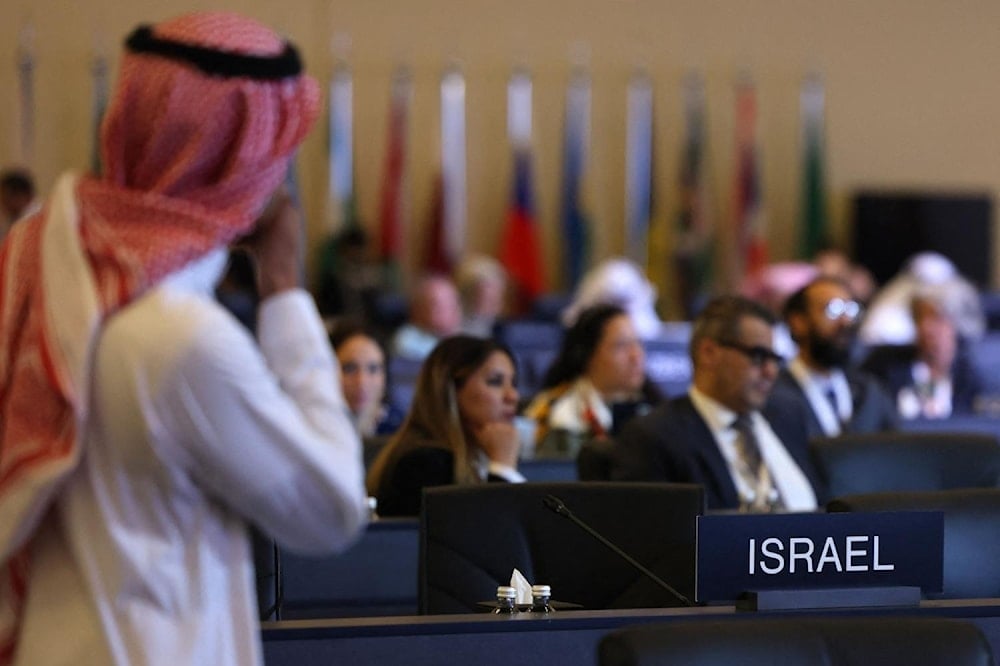Bloomberg: KSA arresting those criticizing 'Israel' online
A Bloomberg report says that a main part of Saudi Arabia's fears is that growing sentiment against the occupation could impact normalization efforts.
-

A plaque used to reserve the seat of the delegation from the Israeli occupation is seen during the UNESCO Extended 45th session of the World Heritage Committee in Riyadh, Saudi Arabia on September 11, 2023. (AFP)
Saudi Arabia is arresting individuals criticizing the Israeli occupation over its genocidal war on Gaza on social media platforms as normalization talks reach an advanced stage, Bloomberg reported on Thursday.
The recent campaign of arrests is reportedly linked to security concerns, according to officials and rights activists.
This crackdown comes after the Israeli aggression on the Strip sparked outrage among Arab nations against the occupation, fracturing years of normalization efforts. Similarly, this sentiment has been echoed in the Western world, where growing protests, especially on university campuses, have been observed recently.
Read more: US bidding 'historic' deal to secure Saudi-Israeli normalization: WSJ
Saudi Arabia and its regional allies, including Egypt and Jordan, have expressed concern about this trend.
According to the report, the countries feared some parties could "exploit" the situation, which could lead to protests against governments similar to the Arab Spring.
No boycotts
Recent detentions in Saudi Arabia have involved a senior executive linked to the country's Vision 2030 economic plan, Bloomberg said, citing sources both inside and outside the kingdom. The individual in question was detained due to expressing opinions on the war on Gaza that authorities considered to be "incendiary".
A media figure who said that the occupation "should never be forgiven" was detained by authorities, the sources added. Another individual calling for the boycott of American fast food places in Saudi Arabia - for Washington's direct involvement in the genocide - was also arrested.
Read more: Why is Saudi Arabia open to normalize relations with 'Israel'?
As per the news site, an individual familiar with the Saudi government's perspective acknowledged the recent arrests, attributing them to a heightened state of alert since the Resistance's October 7 operation, and a government effort to discourage individuals from making online statements regarding the Israeli war on Gaza that could jeopardize "national security."
Saudi opposition figures and activists in the US are hosting their largest conference since the 2018 murder of US-Saudi journalist Jamal Khashoggi. They plan to unveil a vision for the kingdom "emphasizing free speech and the release of political prisoners."
Hopes for normalization
The United States and Saudi Arabia have formulated a series of pacts regarding security and technology exchange, initially intended to be part of a larger Middle East resolution encompassing "Israel" and the Palestinians, The Guardian reported on Wednesday.
In this scenario, the allies would enter into agreements covering a bilateral defense pact, American assistance in developing Saudi Arabia's civil nuclear energy sector, and extensive cooperation in advanced technologies such as artificial intelligence. The occupation entity will join a trilateral pact if normalization talks succeed.
During remarks in Riyadh on Monday, US Secretary of State Antony Blinken reiterated the connection between a potential US-Saudi agreement, normalization between Saudi Arabia and "Israel", and advancements toward establishing a Palestinian state.
Read more: Israeli-Saudi normalization in Checkmate, a realist analysis
Jane Kinninmont, a Gulf expert and the Policy and Impact Director at the European Leadership Network, suggested that Riyadh's recent crackdown on pro-Palestine sentiment on social media could indicate a serious intent to normalize relations with "Israel".
“If they want to change their policy and go and visit Israel and have Israelis come to Riyadh, when the war looks different, then they do not want there to be a kind of established pro-Palestinian movement that would be protesting at that sort of thing,” she said.
“People are very upset about what’s happening in Palestine and expect a strong response from their country but they don’t see it,” said Yahya Assiri, a Saudi opposition figure residing in the UK, who established a group that monitors human rights violations in the kingdom.
Read more: Gaza captive, ceasefire deal 'crucial' for Biden strategy: Axios
Anger over the Israeli war on Gaza is often linked to discontent over other state policies, particularly regarding the economy, he said.
“These linkages are very worrisome for them but their [security services] fears are exaggerated."
With the presidential elections looming, and due to concerns about losing its influential position in the Middle East, Biden continues to abandon most of his earlier efforts to distance himself from Crown Prince Mohammed Bin Salman, despite concerns over issues such as the Khashoggi murder. This shift led to a reconciliation between the US and Saudi Arabia, symbolized by a controversial fist bump between Biden and MBS during a presidential visit to Jeddah in 2022.

 5 Min Read
5 Min Read








